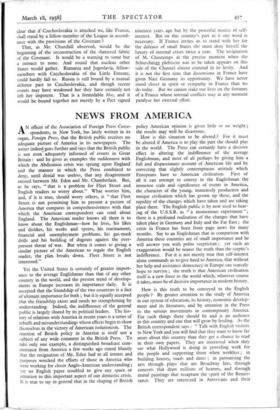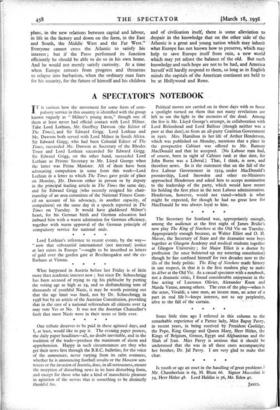NEWS FROM AMERICA
AN officer of the Association of Foreign Press Corre- spondents, in New York, has lately written in its organ, Foreign Press, that the British public receives no adequate picture of America in its newspapers. The writer indeed goes further and says that the British public is not even adequately informed of events in Great Britain : and he gives as examples the suddenness with which the Abdication crisis was sprung upon England and the manner in which the Press combined to deny, until denial was useless, that any disagreement existed between Mr. Eden and Mr. Chamberlain. But, as he says, " that is a problem for Fleet Street and English readers to worry about." What worries him, and, if it is true, should worry others, is " that Fleet Street is not permitting him to present a picture of America that compares in comprehensiveness with that which the American correspondent can send about England. The American reader knows all there is to know about the Englishman—how he lives, his likes and dislikes, his works and sports, his rearmament, financial and unemployment problems, his gas-mask drills and his building of dugouts against the ever- present threat of war. But when it comes to giving a similar picture of the American to regale the English reader, the plan breaks down. Fleet Street is not interested."
Yet the United States is certainly of greater import- ance to the average Englishman than that of any other country in the world, and the present trend of develop- ments in Europe increases its importance daily. It is accepted that the friendship of the two countries is a fact of ultimate importance for both ; but it is equally accepted that the friendship exists and needs no strengthening by understanding. Indeed, the indifference of the general public is largely shared by its political leaders. The his- tory of relations with America in recent years is a series of rebuffs and misunderstandings whose effects begin to show themselves in the victory of American isolationism. The reaction of British policy in America is itself not a subject of any wide comment in the British Press. To take only one example, a distinguished broadcast com- mentator from America a few weeks ago stated bluntly that the resignation of Mr. Eden had to all intents and purposes wrecked the efforts of those in America who were working for closer Anglo-American understanding ; yet no English paper troubled to give any space or attention to this important aspect of our domestic crisis. It is true to say in general that in the shaping of British policy American opinion is given little or no weight ; the results may well be disastrous.
How is this situation to be altered ? For it must be altered if America is to play the part she should play in the world. The Press can certainly have a decisive effect in altering the indifference of the average Englishman, and most of all perhaps by giving him a full and dispassionate account of American life and by correcting that slightly contemptuous attitude which Europeans have to American civilisation. First of all it can attempt to convey to the Englishman the immense scale and significance of events in America, the character of the young, immensely productive and unique civilisation which has grown up there, and the rapidity of the changes which have taken and are taking place there. The English public is by now used to hear- ing of the U.S.S.R. as " a momentous experiment " ; there is a profound realisation of the changes that have taken place in Germany and Italy and the Far East ; the crisis in France has been front page news for many months. Say to an Englishman that in comparison with -America these countries are of small importance and he will answer you with polite scepticism ; yet such an exaggeration would be nearer the truth than the sceptic's indifference. For it is not merely true that self-interest alone commands us to give heed to America, that without her help and assistance democracy in Europe can scarcely hope to survive ; the truth is that American civilisation itself is a new force in the world which, whatever course it takes, must be of decisive importance in modern history.
How is this truth to be conveyed to the English people ? By greater attention to the study of America in our system of education, its history, economic develop- ment and its literature, and by attention in the Press to the serious movements in contemporary America. For such things there should be and is an audience in this country and one that will grow by feeding. As the British correspondent says : " Talk with English visitors to New York and you will find that they want to know far more about this country than they get a chance to read in their own papers. They are interested when they see what Hollywood is doing in providing work for the people and supporting them when workless ; in building houses, roads and dams ; in patronising the arts through plays that are Broadway hits, through concerts that draw millions of hearers, and through mural paintings that recapture the spirit of the Renais- sance. They are interested in Americans and their plans, in the new relations between capital and labour, in life in the factory and down on the farm, in the East and South, the Middle West and the Far West." Everyone cannot cross the Atlantic to satisfy his interest ; but if the Press performed its function efficiently he should be able to do so in his own home. And he would not merely satisfy curiosity. At a time when Europe retreats from progress and threatens to relapse into barbarism, when the ordinary man fears for his security, for the future of himself and his children and of civilisation itself, there is some alleviation to dqspair in the knowledge that on the other side of the Atlantic is a great and young 'nation which may inherit what Europe has not known how to preserve, which may help to save Europe itself from ruin, a new world which may yet adjust the balance of the old. But such knowledge and such hope are not to be had, and America herself will hardly respond to them, so long as in English minds the capitals of the American continent are held to be at Hollywood and Reno.















































 Previous page
Previous page